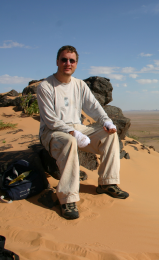
3:30 pm to 12:00 am
Event Location: 1305 NSH
Bio: Dr. Iain Couzin is an Assistant Professor in the Department of Ecology and Evolutionary Biology and Associated Faculty in Applied and Computational Mathematics at Princeton University since 2007. Before joining the faculty at Princeton he was Royal Society University Research Fellow in the Department of Zoology, University of Oxford, and Junior Research Fellow in the Sciences at Balliol College. His work aims to reveal the fundamental principles that underlie evolved collective behavior, and consequently he studies a wide range of biological systems, from brain tumors to insect swarms, fish schools and human crowds. He has published his research in leading international journals including Nature, Science, Proceedings of the National Academy of Sciences USA and Current Biology. He is an Editor of Behavioral Ecology, Associate Editor of Advances in Complex Systems, on the Editorial Board of Journal of Nonlinear Science and guest editor of PLoS Computational Biology. In recognition of his innovative research he was recipient of a Searle Scholar Award in 2008 and the Mohammed Dahleh Award and Distinguished Lectureship form the University of California Santa Barbara in 2009.
Abstract: Animal groups such as bird flocks, insect swarms and fish schools are spectacular, ecologically important and sometimes devastating features of the biology of various species. Using a combined theoretical and experimental approach involving insect and vertebrate groups, I will address how, and why, individuals move in unison and investigate the principles of information transfer in these groups, particularly focusing on leadership and collective consensus decision-making. An integrated ‘hybrid swarm’ technology is introduced in which multiple robot-controlled replica individuals can interact within real groups allowing new insights into group coordination. These results will be discussed in the context of the evolution of functional complexity and pattern formation in biological systems.
